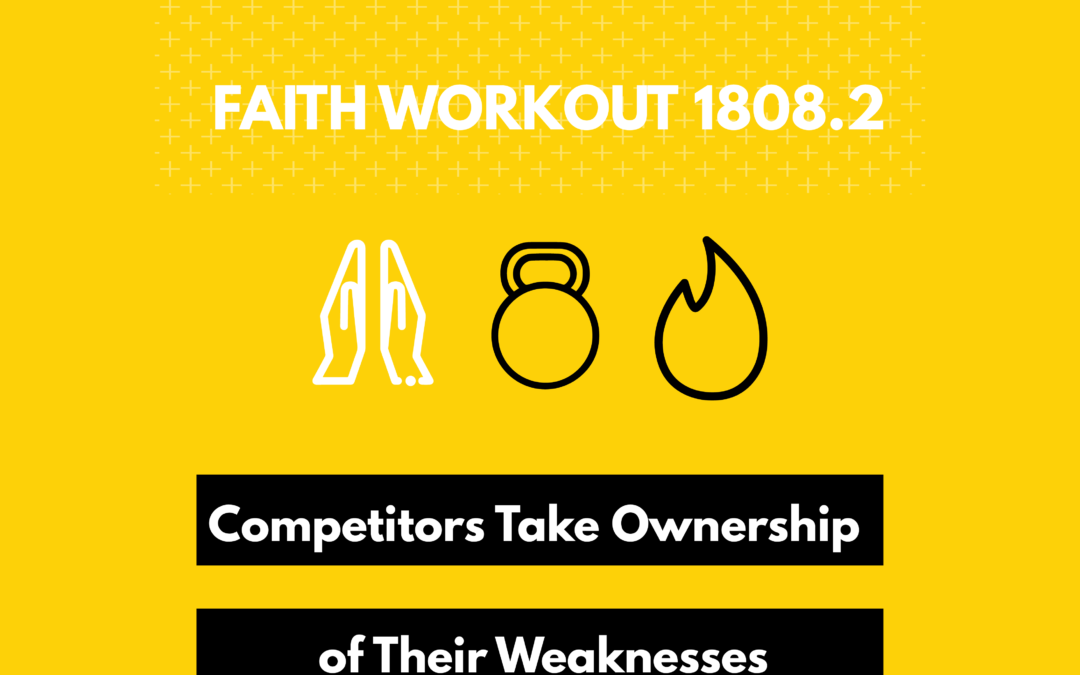READ
Nehemiah 1:5-11
REFLECT
Today’s Faith Workout is a continuation of our study of the life of Nehemiah. It is adapted from a sermon from one of our original founding team members, Jeff Schlenz, gave to his Church. It’s another endurance Faith Workout, so longer than our typical workouts, but worth it.
3. And they said to me, “The survivors who are left from the captivity in the province are there in great distress and reproach. The wall of Jerusalem is also broken down, and its gates are burned with fire.”
4. So it was, when I heard these words, that I sat down and wept, and mourned for many days; I was fasting and praying before the God of heaven.
Nehemiah is wrecked spiritually and emotionally by the news that things are not the way they ought to be. Ever felt that way? Ever looked at something in your life and said, this isn’t right, this shouldn’t be, this shouldn’t have happened? Have you ever experienced regret, remorse, or frustration? And have you ever asked the question, “Why? Why did it turn out this way?”
Well, Nehemiah knows the answer. In this case, the Jews were suffering as a direct result of their sin. That’s not always the case, it would be horrendously cruel to suggest that anyone who was suffering in any way was simply experiencing the punishment of God. And yet, there is no denying that it does happen some times–like this one. The Jews had wandered away from God and now they were suffering as a result.
Nehemiah understands that. But He also knows God promised it didn’t have to stay that way.
God has always warned us of the dangers of being separated from Him. Being separated from Him for eternity is called hell. But He also always promised an open door to those who return to Him, it’s a process called repentance, and we see it played out this morning in Nehemiah’s prayer.
DISCUSSION
1. Nehemiah Repents
5. And I said: “I pray, LORD God of heaven, O great and awesome God, You who keep Your covenant and mercy with those who love You and observe Your commandments, 6. please let Your ear be attentive and Your eyes open, that You may hear the prayer of Your servant which I pray before You now, day and night, for the children of Israel Your servants, and confess the sins of the children of Israel which we have sinned against You. Both my father’s house and I have sinned. 7. We have acted very corruptly against You, and have not kept the commandments, the statutes, nor the ordinances which You commanded Your servant Moses.
Repentance involves the mind, which understands that the sin is wrong, the heart, which feels remorse, and the will, which determines to change. That sounds an awful lot like a fulfillment of the Great Commandment to love God with all your heart, soul, mind, and strength, doesn’t it!?!
I’m not saying you have to turn into a blubbering bucket of tears or else you’re not really sorry – but I am saying that you ought to have some sense of the weight, conviction, and sorrow of your sin.
And that’s true whether you’re coming to God to ask for forgiveness the first time leading to salvation, or whether you’re asking for a reset for the sins you’ve committed today as a Christian. If we truly understand who God is and what sin is – that it rebels against Him, that it chooses us over Him, that it tells Him, “I know what You’ve said, but I’ve got my own reasons for doing something different” – if you understand what you have done and Who you have done it to, that ought to have some kind of emotional impact on you or you have to wonder – am I really repentant?
Read through the pages of the New Testament and you see a lot of emotion when repentance is involved – you see people – grown men and women, respectable men and women – crying publicly over their sins and their need as they come to Jesus. And at the same time the opposite is true – you see people who disagree, who won’t accept what Jesus says getting angry, violently angry as they deny the message. The gospel is directed to the whole person – and that includes the emotions – not just the emotions all by themselves, but they are definitely a part.
Another part of repentance is that which is processed by the mind – the intellectual comprehension of what is going on. We see that in Nehemiah as well, right? He knew, he understood, several things.
Nehemiah knows who he is praying to.
He’s not just throwing something up to “the big man upstairs” or some nebulous, undefined, unknown, concept of God.
Because the God Nehemiah is praying to, the God I pray to, the God I hope you’re praying to, has a name, and He has a character, He has an identity and He can be known. Prayer, by itself has no value, it derives it’s value out of the One it is directed towards. You can’t ask for forgiveness if you don’t know who you have offended. You can’t draw near to God if you don’t know Who He is.
Nehemiah knows that he has sinned against God.
He understands that. He doesn’t deny or refute it, he doesn’t question whether or not it was really sin, and he doesn’t rationalize, minimize, or try to explain it away. He accepts the current condition as a result of past choices.
Is that true with you? Can you call sin, sin? Or, are you trying to argue for why things are different in your case, or trying to ignore conviction or instruction, hoping it will go away? Well, you need to know something: You can’t be forgiven until you admit your guilt.
2. Nehemiah Asks For Forgiveness
Nehemiah is asking forgiveness because (vs 6) “we have sinned against You. Both my father’s house and I have sinned. 7 We have acted very corruptly against You, and have not kept the commandments, the statutes, nor the ordinances which You commanded Your servant Moses.”
The only reason he’s generalizing there is because of the comprehensiveness of their sin. He can’t make a list long enough to say everything they did, so he admits to the nature of it. It would be like if you had told a bunch of lies – you could ask for forgiveness for lying to someone, without naming each and every lie. But you don’t just say, “I’m sorry for not treating you right. No, you say, please forgive me for lying to you.”
Getting back to Nehemiah – he knows who God is, he knows what sin is, but he also knows there is a way out of this mess:
9. but if you return to Me, and keep My commandments and do them, though some of you were cast out to the farthest part of the heavens, yet I will gather them from there, and bring them to the place which I have chosen as a dwelling for My name.
Sin is turning away from God, repentance is turning back toward Him, “if you return to Me, and keep My commandments and do them.” The consequence of sin is separation from God, the consequence of repentance is reunion with God, “though some of you were cast out to the farthest part of the heavens, yet I will gather them from there, and bring them to the place which I have chosen as a dwelling for My name”
And Nehemiah says He and some of the others are in. They see what is wrong, they understand it, they feel it, now they want to do something about it. Nehemiah even hints that he has a plan for what to do:
10. Now these are Your servants and Your people, whom You have redeemed by Your great power, and by Your strong hand. 11. O Lord, I pray, please let Your ear be attentive to the prayer of Your servant, and to the prayer of Your servants who desire to fear Your name; and let Your servant prosper this day, I pray, and grant him mercy in the sight of this man.
Here is a vital part of repentance – we said repentance involves the heart – feeling true regret for sin, and it involves the mind – understanding who God is and what our sin was/is so that we can be forgiven, but repentance also involves the will – a desire to do something about the situation, a desire to change with God’s help.
Let me say that again, because both parts are important. Repentance includes 1.) a desire to change, 2.) with God’s help.
The rest of this book is the story of how things turned out. But what we need to see this morning is that the whole thing began with repentance. It began with understanding who God was, what He had commanded and how not obeying His commands had led to the current situation. But it also included knowing that there was a way to repent – a way to be forgiven, a way to change, because God had made it possible.
Repentance is not a ‘one and done’ – we all need to repent, regularly – daily – multiple times daily. We’re swimming against the current in life and it’s constantly pulling us away from God. So Christian, what is it you need to repent of today – in your relationship with God or in your relationship with someone else – where is the change that needs to occur?
SKILL WORK
Take a moment to reflect and journal.
- What does this section of Scripture teach me about God and what does it teach me about me?
- Think about the place where you are at. Can you call sin, sin? Or, are you trying to argue for why things are different in your case, or trying to ignore conviction or instruction, hoping it will go away?
Spending time acknowledging and owning the areas of sin in our lives is not so we can earn God’s love. He already love us. If you have a relationship with him then you are now a saint in His eyes, a saint who sins. Our sin is not what defines us. However, He does want to see us thriving and living full lives. The way we can not only saved, but also become more like him is if we bring those sin areas to light, repent, ask for forgiveness and then, with the Holy Spirit’s help, overcome them.








